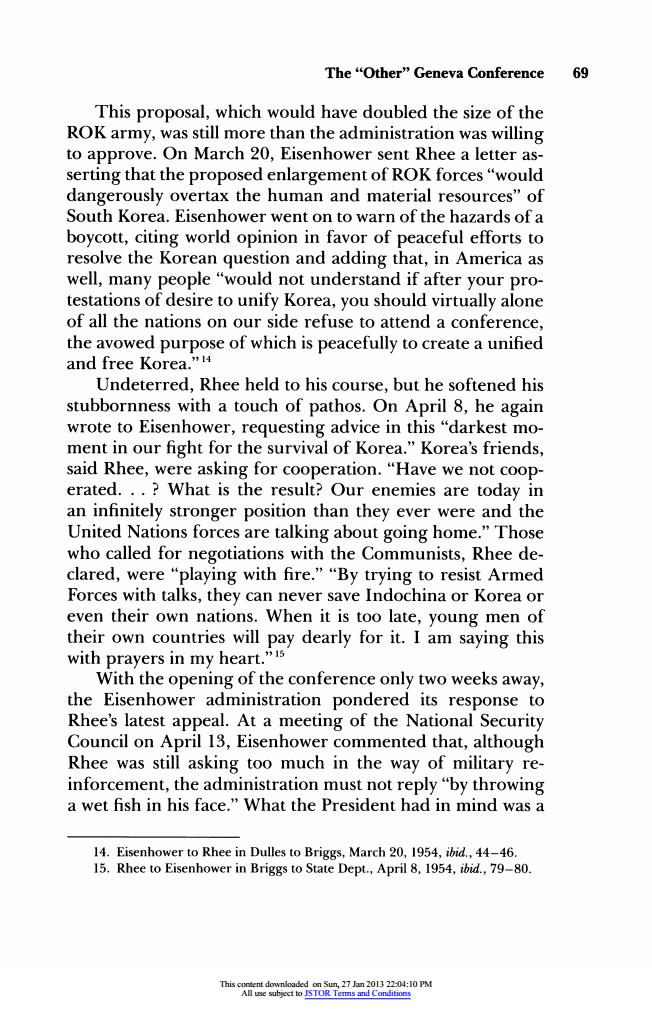正在加载图片...

The“Other”'Geneva Conference 69 This proposal,which would have doubled the size of the ROK army,was still more than the administration was willing to approve.On March 20,Eisenhower sent Rhee a letter as- serting that the proposed enlargement of ROK forces"would dangerously overtax the human and material resources"of South Korea.Eisenhower went on to warn of the hazards of a boycott,citing world opinion in favor of peaceful efforts to resolve the Korean question and adding that,in America as well,many people"would not understand if after your pro- testations of desire to unify Korea,you should virtually alone of all the nations on our side refuse to attend a conference, the avowed purpose of which is peacefully to create a unified and free Korea."14 Undeterred,Rhee held to his course,but he softened his stubbornness with a touch of pathos.On April 8,he again wrote to Eisenhower,requesting advice in this"darkest mo- ment in our fight for the survival of Korea."Korea's friends, said Rhee,were asking for cooperation."Have we not coop- erated...?What is the result?Our enemies are today in an infinitely stronger position than they ever were and the United Nations forces are talking about going home."Those who called for negotiations with the Communists,Rhee de- clared,were“playing with fire.”“By trying to resist Armed Forces with talks,they can never save Indochina or Korea or even their own nations.When it is too late,young men of their own countries will pay dearly for it.I am saying this with prayers in my heart."5 With the opening of the conference only two weeks away, the Eisenhower administration pondered its response to Rhee's latest appeal.At a meeting of the National Security Council on April 13,Eisenhower commented that,although Rhee was still asking too much in the way of military re- inforcement,the administration must not reply"by throwing a wet fish in his face."What the President had in mind was a 14.Eisenhower to Rhee in Dulles to Briggs,March 20,1954,ibid.,44-46. 15.Rhee to Eisenhower in Briggs to State Dept.,April 8,1954,ibid.,79-80. This condent downloaded on Sun,27 Jan 2013 22:04:10 PM All use subpect to JSTOR Terms and ConditionsThe "Other" Geneva Conference 69 This proposal, which would have doubled the size of the ROK army, was still more than the administration was willing to approve. On March 20, Eisenhower sent Rhee a letter asserting that the proposed enlargement of ROK forces "would dangerously overtax the human and material resources" of South Korea. Eisenhower went on to warn of the hazards of a boycott, citing world opinion in favor of peaceful efforts to resolve the Korean question and adding that, in America as well, many people "would not understand if after your protestations of desire to unify Korea, you should virtually alone of all the nations on our side refuse to attend a conference, the avowed purpose of which is peacefully to create a unified and free Korea.""4 Undeterred, Rhee held to his course, but he softened his stubbornness with a touch of pathos. On April 8, he again wrote to Eisenhower, requesting advice in this "darkest moment in our fight for the survival of Korea." Korea's friends, said Rhee, were asking for cooperation. "Have we not cooperated. . . ? What is the result? Our enemies are today in an infinitely stronger position than they ever were and the United Nations forces are talking about going home." Those who called for negotiations with the Communists, Rhee declared, were "playing with fire." "By trying to resist Armed Forces with talks, they can never save Indochina or Korea or even their own nations. When it is too late, young men of their own countries will pay dearly for it. I am saying this with prayers in my heart."'15 With the opening of the conference only two weeks away, the Eisenhower administration pondered its response to Rhee's latest appeal. At a meeting of the National Security Council on April 13, Eisenhower commented that, although Rhee was still asking too much in the way of military reinforcement, the administration must not reply "by throwing a wet fish in his face." What the President had in mind was a 14. Eisenhower to Rhee in Dulles to Briggs, March 20, 1954, ibid., 44-46. 15. Rhee to Eisenhower in Briggs to State Dept., April 8, 1954, ibid., 79-80. This content downloaded on Sun, 27 Jan 2013 22:04:10 PM All use subject to JSTOR Terms and Conditions